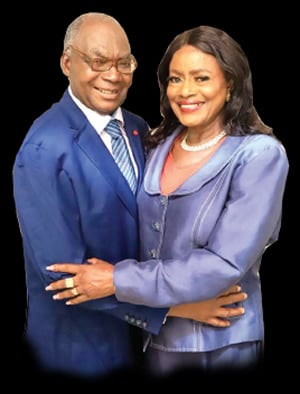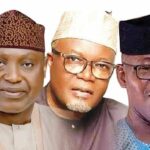Eighty-year-old twin brothers from Edo State, David and Joshua Ukponmwan, who studied the same course and both became professors, speak to GODFREY GEORGE about their growing up, career and families
Tell us a bit about yourself.
I am a knight of St. Christopher, Anglican St. Matthew Church, Benin-City, Edo State. I am the last born of my mother; we are seven in all. We were born in an Anglican maternity home in 1942. Our home was a Christian home and it has been part of our upbringing and origin up to this point.
Between you and your twin brother, who was born first?
According to the Benin tradition, the twin that comes out first is taken as the older one, but the reverse is the case in the Yoruba tradition, where the twin who comes out first is considered the younger one. In our case, I came out first but my twin brother will never accept that I am older than him (laughs). We argue about this all the time; he would say it was just a few minutes and it doesn’t mean anything.
What memories define your childhood?
Hmmmn… My childhood was one blessed with very fun memories. We were a closely-knit family, so we did a lot of things together. As my brother must have told you, we are from a polygamous home because our mother, the first wife, didn’t give birth to a male child on time and all that, but that didn’t stop us from achieving all our dreams.
I remember my twin brother and I playing a lot of pranks on people because we were so identical. Even our parents, I am sure, must have had a hard time telling us apart. We had the best education since our parents were people who believed so much in education and Nigeria was not as bad as it is now. Growing up in Benin is something I cannot trade for anything because we were taught a lot of values and morals which to date have helped us to be better persons.

You went into textile science and technology. What really drew you to that area?
Most of the textile industries were owned by foreigners, particularly Indians, Lebanese and other nationalities. There was not much involvement of the indigenous people in the industries then. We were not very happy about that setting. So, we (my twin brother and I) decided to go into textile technology. That was how we went for further studies abroad. When we came back (from England), I joined the Centre for Management Development, Lagos after my master’s in Glasgow. It was a textile supervisory programme which was then headed by some International Labour Organisation experts. I was one of the ILO counterparts. It was a government parastatal. I was directly involved in textile production and conducted a lot of work in the industry at the supervisory and managerial levels.
My twin brother at that time had also finished his first degree, and went straight to join the University of Ife (now OAU, Ile-Ife) to lecture. We always saw each other. He made sure to come to Lagos to do some courses so we used that opportunity to see often. That was what gave us the idea to go for further studies, so that we would not be cut off from our original thoughts since we were not able to set up our own textile industries. We just wanted to be able to make our contribution to textile development.
Then the only institution that offered a textile course was Kaduna Polytechnic, which was a gift from the British government to the North. There were no other textile institutions in the country at that time. I taught at Kaduna Polytechnic for two years after my first degree before I went for my master’s. Later on, Ahmadu Bello University, Zaria started textile courses before other federal institutions like the Federal University of Technology, Owerri, Imo State, started their own course.
Did you lecture at FUTO?
Yes, I did. I was very anxious to join the university system at that time because things were so organised in the university than in the public or civil service. Unfortunately, the reverse is the case now. It was in FUTO that I cut my teeth in the academia till I became a professor in the Department of Polymer after working for over 22 years. My brother was at UNIBEN while I was at FUTO. It was when I voluntarily retired from FUTO in 2007 that I went to UNIBEN to work on contract basis for about four years before I left active teaching.
What was the experience like at FUTO?
FUTO is a nice place since I was one of the pioneer lecturers. I was the third professor in the department. There were two other professors before me. With hard work and cooperation from my senior and junior colleagues, I rose to become the Head of the Department and served for several years. I was also the Director of Academic Planning for four years. I was a member of the university Senate for years. I held several positions. I had a very successful time at FUTO that when I came down to Benin, FUTO was still inviting me as an adjunct professor to help them because they were short of qualified staff in my area to teaching and supervision of master’s and PhD students. My twin brother and I were the two earliest textile professors in Nigeria.
One beautiful thing about us both as professors of textile is that we were often invited together to assess and supervise other lecturers who want to get promoted to professors. We have been on the same panel on many occasions and they’d had to use our initials to differentiate us because we were both known as Prof Ukponmwan. So, one was D. Ukponmwan; the other, J. Ukponmwan (laughs).
What makes you so fulfilled as a professor of textile now that you are retired?
Most of the students that I taught at FUTO are now professors. It makes me so fulfilled to watch them grow and blossom in their careers. I even have one who is on sabbatical in Malaysia. I have imparted the knowledge that God has given me to others and they have carried on the textile education. Being a professor was a very remarkable achievement which was only made possible by the grace of God. Although it was not easy, with hard work, we were able to keep on going till we retired.
The Nigerian textile industry used to be viable but it’s virtually non-existent now. What really happened?
Except the government has an honest intervention to look into the situation in the textile industry, there may not be a revival. The government also has to encourage Nigerian entrepreneurs to be interested. It is not going to be an easy road because the textile industry is a very capital-intensive one. Our time when we were studying, the materials were very expensive for the different stages when we had to handle textile raw materials. That was why most Nigerians at that time were not willing to go into the textile industry because it was not one where one would get a quick return. Textile is a long-term investment. One had to plan. It is only with good planning that one is going to achieve success in the industry. The machines are very expensive and they have to be working for 24 hours, which would be three work shifts. I was glad when I heard that a northern state, Kaduna or so, had made a move to revive their textile industry but the FG should take the lead to make sure that all those moribund textile industries in the other part of the country are revived to resume work. It is a very viable industry; it is a continuous process in life because everybody must wear clothes. It is a revenue-generating industry that can also create a lot of employment for the employable masses.
Apart from textile, the country is in a mess. Our politicians did not put their houses together to do the right thing. They were carried away by the old British mentality and colonisation. They have refused to do things the way they should be done. Otherwise, we wouldn’t be having this problem we are facing now. See the way the politicians are displaying (unexplained wealth). See the level of corruption. They should involve the youths who have been hitherto neglected for a very long time. I am so glad that the youths are springing up in the realisation that this is not the country they want.
Look at France, their President is just in his 40s. Here, we were rotating leadership among the old people. We need to have a change of heart and do things for the good of the entire country. As things are now, only the almighty God can deliver Nigeria because things have gone haywire.
The country would be in an electioneering season next year. What kind of leader do you think Nigerians should elect in the forthcoming general elections?
We need a much younger person who has the integrity, knowledge, experience, education and know-how that can move the nation forward. We need one who has a listening ear, one who would listen to the masses. The person must have forthright insight into planning and development.
Let’s talk about family. Who got married first between you and your twin brother?
When we were here in England, doing our first degree, I first got married. But that didn’t work. For a long time, I wasn’t married until when I came back for my PhD that I got married to my beautiful wife, the Dame Dr (laughs).
How old were you then?
When I first got married, I was 27 years. But, in my present marriage, I was around 38 years old.
How has the experience been with this marriage?
Well, my experience has been one filled with patience. Everything is about patience. Once you are patient and have God on your side, you will definitely succeed. Perhaps, I wasn’t as patient in the first one (marriage) so I had to learn how to be patient, so this one would work.
Where did you meet your wife?
We met in Benin City through family connections. After I had the first disappointment, my families were a bit worried and wanted me to get married again, so they were involved in the ‘search party’ and process that brought me this beautiful woman. She was a teacher at the University of Benin International School before she went for her PhD. After her PhD, she was drafted to join the Department of Foreign Languages, UNIBEN, as a lecturer.
Did you also wait for a while like your twin before the kids started to come?
My twin brother had been married for over 30 years before they could have a child. It was a really troubling period for them. About 1985, when our last born was supposed to be born, was when my twin brother had his first child. So, my last child is the same age as his first child. My first child from my first wife should be around 52 years this year. The second should be 49. Then, from my second wife, the first child just celebrated 40 years; the second is 39 while the last one is 36 years old. They were all born in Glasgow, Scotland when we both came to Scotland for PhD in 1980.
Apart from you and your brother, are there other twins in the family?
Yes, we have plenty of twins in our family. My fourth sister has twin girls who are both medical doctors living in the US. My third sister has twins as grandchildren. My wife’s immediate junior brother has twin girls and my wife’s mother’s last born has twin boys.
At 80, what are you most grateful for?
I am grateful for life and my very intelligent wife. I am grateful for my children who are all doing well, and I am glad my twin brother and I are doing well though we are both hard on hearing, we do not have any debilitating sickness that is threatening our life. For all that, I say, “Thank you, Jesus.”





